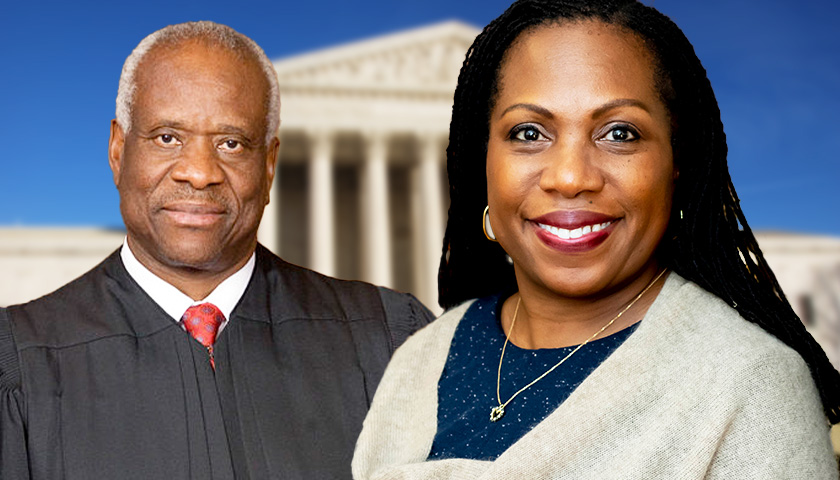by Ken Masugi
Observers of the Supreme Court should ask themselves what’s the more preposterous mainstream media mindmeld: whether Justice Clarence Thomas should recuse himself or resign over his wife’s political activism, or the legal brilliance of the Supreme Court Justice-to-be, Judge Ketanji Brown Jackson.
Truth be told, what we have here is the myrmidon media’s mockery of the most brilliant Supreme Court justice ever, one they have derisively dismissed as a lawn jockey of the Right, a lackey of the late Justice Antonin Scalia, someone who will be tutored on race by future Justice Jackson, and now a pawn or puppet of his wife. The actual contrast between the two judges could hardly be greater. Of course, neither justice should be held completely responsible for the allies he attracts.
Lower court ethical standards do not properly apply to the Supreme Court, and the public should expect and accept the political involvement of the justices along with the rest of Washington. After all, Supreme Court justices have often been selected from political backgrounds: Democratic Senator (and former Klansman) Hugo Black, former FDR presidential adviser Felix Frankfurter, and former California Governor (and Republican vice-presidential candidate) Earl Warren, just to name the more notorious. Nor should anyone be so naïve (or dishonest) as to believe these lauded justices cut their political ties once they ascended to the Court. It is easy to see why one’s political views (never mind those of a spouse) have never been the basis for a justice recusing himself. Otherwise, justices might be impeached based on their politically active friends, church attendance, internet browsing, book clubs, or newspaper subscriptions.
Since the 1980s, Republicans have drawn their Supreme Court appointments from the appellate courts, and the Democrats have followed suit, though their ideological fervor would make them open to a broader range of possibilities. The growing emphasis on appellate court experience is a sign of unfortunate emphasis on specialization in public service that favors insulated judges over the common sense of political life and favors the enhancement of the judiciary as a separate part of American life. The law schools specialize in teaching exotic progressive theories which flatter the despotic method in American politics, a mindset that favors Democrats, always better at ruthlessness than their couth opponents.
Like their titular, now politically incorrect founder Thomas Jefferson, today’s Democratic Party wants to destroy its opposition, making it the “party to end all parties.” Otherwise, they argue, democracy is at risk from enemies at home and abroad. Prior to the Civil War, Stephen Douglas argued that the new Republican Party was a threat to the Constitution and the rights of Americans. And Chief Justice Roger Taney pontificated that legal containment of slavery (the core belief of the new party), violated basic rights of due process guaranteed by the Fifth Amendment of the Constitution.
But this combination of bad law with a narrower scope for democratic politics just encourages a different sort of politicized jurisprudence. In other words, trying to take politics out of the law merely forces politics to disguise itself, which makes it even more insidious. A leading contemporary example is Chief Justice Roberts’ alarming opinion in the Obamacare case, in which the Republican appointee voted along with the liberal justices to affirm the constitutionality of Obamacare as a tax. He thus avoided putting the Court on the anti-Obamacare Republican side of the 2012 presidential campaign, while setting congressional Republicans up with a winning campaign theme that year and in 2014 and 2016, which contributed to their subsequent political successes. Being Republicans, they of course did little with the opportunity. Roberts provided a weak argument for Obamacare’s constitutionality and armed both parties with political ammunition. Of course this effort to depoliticize the Court only encouraged future intimidation by Democrats.
Add to that Justice Neil Gorsuch’s gender-bender opinion in Bostock v. Clayton County (2020), we see that Republican appointees to the Court have often served simply to protect their liberal colleagues from charges of partisanship—by making allegedly apolitical decisions that are in fact guided by politics and not constitutional principle.
All of this judicial politics goes to show the real animus motivating attacks on Justice Thomas. In the leftist view, the Court has been lacking in progressive fervor, and the Thomases are the obvious cause and a continued threat. Ginni, at the time, questioned the 2020 election results, condemned those who were violent, but was not present for the fracas at the Capitol. Perfectly respectable views and actions, but anathema to progressives because they were pro-Trump.
A leftist politicized court is their standard, not the rule of law, and they will fabricate, distort, and defame to achieve that end. The Democrats reflect their ancestors Stephen Douglas and Roger Taney in this regard. In fact, it makes far more sense to question the objectivity of a justice of the Supreme Court who regularly reads (for example) the Washington Post than that of Ginni Thomas. Exposure to lunacy of this sort will warp a mind and render it incapable of seeing straight.
Which takes us back to the future Justice Jackson. She fails the test of what a Supreme Court justice ought to be on a few grounds. One, for all the talk about her judicial greatness, that reputation depends on her work as a trial judge. But the Supreme Court is about appellate judgments, and she has been an appeals court judge for less than a year.
More importantly, what credibility can anyone bring to the court if she can’t define what a woman is? It was not a trick question. Turning it into a trick question is the sort of perversion of reality that needs to be kept out of the law, the courts, and public life altogether.
Finally, Judge Jackson missed on the biggest question of all, a two-part one. The first part is whether she believes in the natural rights proclaimed in the Declaration of Independence. Her response: “I do not hold a position on whether individuals possess natural rights.” Two conservative commentators, Ed Whalen of National Review and Terence Jeffrey at RealClearPolitics noted this nihilistic response. Her substitution of “methodology” for “ideology” exposed her nihilism. As her husband’s ancestor, Justice Oliver Wendell Holmes put it, “if my fellow citizens want to go to Hell I will help them. It’s my job.” This is the legal equivalent of not knowing what a woman is.
For all their justified outrage about Judge Jackson’s rulings on child pornography defendants, the failure to focus on her nihilism exposed at the beginning of the hearings was a crucial mistake. Her own and her colleagues’ weak sentencing surrounding child pornography followed as a practical example of the nihilism that is to be expected by her (and their) rejection of the Declaration.
The senators even might have cited Biden’s old critique of Reagan nominee Judge Robert Bork as the basis for their attack on her. After all, isn’t pornography an evil because it assaults human dignity, that is, the equality of human beings and makes its consumers unable to grant to one’s fellow citizens the equal status that republican government demands of them? This is at the heart of Lincoln’s critique of slavery, as we note in his speech on the worst opinion the Supreme Court ever issued, Dred Scott. The contemporary addiction to all forms of pornography is akin to the South’s addiction to slavery. They are both addictions to a tyrannic impulse that exploits and degrades human beings. But the shame is that the Republican presentation made the senators look like the fanatics Lincoln mocked in his Temperance Address. The senators could have made an even harder attack against her if they had blown past her “methodology” and gotten to the root of the problem with her: her nihilism.
Senator John Cornyn (R-Texas) uncovered that vacuity, that lack of intellectual curiosity, in his questioning of her in the context of substantive due process. But Cornyn was wrong to conclude that the main flaw in Chief Justice Taney’s opinion in Dred Scott was reliance on that old conservative whipping boy “substantive due process”; it was rather Taney’s grotesque distortion of the Declaration of Independence as Lincoln noted in his speech.
Unfortunately, the due process hobby-horse is too easy a ride for conservatives: Dred Scott = Lochner = Roe v. Wade, the evils of “substantive due process” expand. They don’t see that it’s the Declaration behind Dred Scott, not to mention other issues. This shows how narrow and distorting the law as a discipline has become. Senators Cornyn, Josh Hawley (R-Mo.), and Ted Cruz (R-Texas), all to various degrees, reflect the legal positivism of the elite law schools that produces the nihilism of their opponent Judge Jackson. Only Senator Tom Cotton (R-Ark.) with his exposure to Claremont ideas knows a way out of this cave. Otherwise, they are all part of it.
This ultimate sharing of views on the Left and the Right was evident earlier in the 1987 confirmation hearing of Judge Bork and the 1991 hearings for Clarence Thomas. Washington Post reporter, Aaron Blake, recalled the role the Declaration and natural rights played in earlier confirmation hearings. This included the Bork and Thomas Senate Judiciary Committee hearings, where chairman Joe Biden condemned Bork for attacking natural law and Thomas for espousing what he views as the wrong version of natural law. In his recent biographical film, “Created Equal,” Thomas had a tart recollection of Biden’s disgraceful performance, which must be viewed to be savored. Now this recent comment of Thomas’ may well have motivated all this recent hive brouhaha by Thomas’s leftist opponents, who are reemerging like Hollywood horror movie creatures. One never quite slams the door on them, in some part because the monsters reside in every human being.
It’s not clear that any justice other than Thomas, including the five other Republican appointees, differs from Judge Jackson’s view of the Declaration. Justice Kagan, based on her comments under questioning by the late Senator Tom Coburn (R-Okla.), asserted that the Declaration was not relevant to her legal work.
So in the past several weeks what have we learned from the bizarre spectacle of a Judge, confirmed by the vote of all the Democrats and three Republicans, who has no particular regard for the Declaration, cannot recall what exactly was wrong with the Dred Scott decision, and can’t define a woman? And this is supposed to be our next, brilliant justice? In the meantime, the justice who knows exactly what this is all about is ridiculed and harangued. And the Thomas view seems not to have even one stout defender in the Senate. Our greatest living American deserves much better from the American Right.
The Declaration is not primarily about being nice to children or racial minorities, though some contemporaries would have you believe this. It is a document for serious Americans about limiting the power of government, of preventing tyranny, and encouraging free men and women to make intelligent choices for self-government, a government by consent of the governed.
Moreover, it makes revolution against an incorrigibly evil order a moral duty. It is the antidote to our contemporary obsession with the administrative state and to bureaucracies without end and without limits to their unchecked powers. Thomas has explained this many times, for over 40 years, including most recently at Notre Dame law school. This Declaration is not the one interpreted by Barack Obama, who disingenuously turned the document into a justification for unlimited political power, led by despised minorities, as he proposed in his second inaugural.
Regrettably, Justice Thomas may well be the only American political figure who honors the Declaration of Independence as its authors intended in his work. On this point, one can’t find people who are farther apart from one another than the Thomases and Judge Jackson.
– – –
Ken Masugi, Ph.D., is a distinguished fellow of the Center for American Greatness and a senior fellow of the Claremont Institute. He has been a speechwriter for two cabinet members, and a special assistant for Clarence Thomas when he was chairman of the Equal Employment Opportunity Commission.
Photo “Ketanji Brown Jackson” by Rose Lincoln. CC BY-SA 4.0. Photo “Clarence Thomas” by Cknight70. CC BY 2.0. Background Photo “U.S. Supreme Court” by Jarek Tuszyński. CC BY-SA 3.0.




